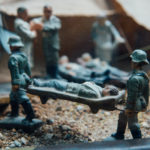On August 17, 2017, cars packed the interstates surrounding Houston as people scrambled to evacuate. Hurricane Harvey was headed in, and millions were headed out.
The next morning, a picture went viral. It was a line of trucks pulling boats. These vehicles also crawled, bumper to bumper on the interstate, but what the internet slowly realized was that these trucks weren’t headed out—they were heading in.
Upon hearing the evacuation orders, these people ran into the storm to help.
Ever since that moment, I’ve been haunted by a question: is this a picture of the American church? Are we the kind of church, who, like the Savior we proclaim (Matt. 14:25), walks into the storm? Or, when the storm comes, do we gather our own and flee?
Salvation Turns Us Outward
One of the primary postures of a Christian is outward. Our salvation means that the curse of the inward curve of sin is broken, and we’re now free to turn outward—to love God and neighbor (Gal. 5:1). Like Abraham, we’re blessed in order to be a blessing to others (Gen. 22:17–18).
Our salvation means that the curse of the inward curve of sin is broken, and we are now free to turn outward—to love God and neighbor.
From plagues in the Roman Empire to cholera in 19th-century London, the church is replete with examples of rejecting fear and embracing neighbor love—even when it means self-sacrifice and risk.
From Fear to Neighbor Love
This is the church’s moment to rise to its call. We stand at the beginning of a crisis. Even if we don’t know exactly how bad this will be, we certainly know that fear is more viral than any virus.
Of course, we must remind ourselves that we have nothing to fear (Deut. 31:8; Matt. 14:27). But it’s equally important to remind ourselves that we don’t drive out fear by wishing it away—we drive out fear by acting in love. Love is what replaces fear (1 John 4:18), and love is always outward—to God and neighbor.
So we must walk into this storm. We must know that we have been equipped, by faith in Jesus, to have the metaphorical trucks and boats necessary to do so (Eph. 2:10; 2 Tim. 3:17).
Here, then, are nine ways Christians can practically love our neighbors in this moment of crisis.
1. Glorify God by Obeying Authorities
One of the primary ways regular people can help curb the spread of a virus is to comply with recommendations (Rom. 13:1–5). Remember we do this not in fear and self-preservation, but as an act of love to the vulnerable whom this sickness might kill. Much of this compliance can become worship-filled acts. Wash your hands and say a 20-second prayer for your neighbors while you do so: “Lord, protect the vulnerable from this virus.” Bump elbows instead of hugging, and intentionally pass peace while you do so: “Peace be with you.”
Of course, you know you’re supposed to do these things, but you may not have realized that these ordinary acts of self-restraint are incredible acts of neighbor love, and should be acknowledged as courageous and spiritually significant. Over the next few months our lives will be filled with the inconvenience of canceling cherished events—but it so happens that self-sacrificial love is always inconvenient.
2. Organize Errands for the Elderly and the Immunocompromised
This virus appears to discriminate. Children (praise God!) aren’t being affected nearly as much as the elderly. Further, healthy people will most likely be fine, while the immunocompromised or those with chronic health conditions are at greater risk. If you (like me) are low-risk, then work with your church or community to organize ways to keep at-risk people safely quarantined and to bring them anything they need.
Over the next few months our lives will be filled with the inconvenience of canceling cherished events—but it so happens that self-sacrificial love is always inconvenient.
The church is well-practiced at bringing meals to new parents or grieving relatives; now is our time to use these systems to benefit the vulnerable. I’m a millennial, and this is an incredible moment for our generation to serve. Singles and couples without kids are especially well-poised to serve.
3. Admit There’s a Crisis, But Don’t Panic
The best leaders don’t lie or hide reality. But they also don’t panic. They tell the truth and lead courageously. One of the unique things about living in a non-authoritarian country is that local leaders can have incredible influence at times such as these.
Pastors, business, and community leaders should understand that, like it or not, they’re suddenly in an incredibly significant role. We can also do this as a collective voice—in our homes, schools, and social media. The church can help lead the public by not downplaying a pandemic that will certainly kill thousands and thousands of more people, but also by stewarding conversation toward outward acts of service, not inward acts of self-protection.
4. Share Good Information; Ignore Bad
This isn’t the time when we need lots of armchair epidemiologists voicing opinions on stats. This is a time when we need to give deference to experts and, importantly, not cloud the air with misinformation (Prov. 15:2). Love your neighbors by sharing important information—don’t harm them by being unwise about what you share.
It’s helpful to share and footnote reliable information; it’s harmful to circulate hearsay (Eph. 4:29). Before you share something on social media, love your neighbor by taking a few minutes to at least read the whole article, and better yet, do your best to verify it’s coming from a reputable source.
5. Serve Healthcare Workers
In a pandemic, we should think of health-care workers as we did first responders during 9/11. They’re the ones risking life and limb to protect others. We should be praying for them, supporting them, bringing meals to them, offering them childcare, and supporting in any ways possible. They’re voluntarily walking into burning buildings to do things we cannot do, so let’s help them with the things we can do.
6. Spend Money as an Act of Economic Love
One of the huge effects of pandemics is fiscal shutdown. The young coffeeshop owner probably won’t get sick, but her business might die if people stop ordering. We must obey authorities, but within those boundaries we must see our spending as an act of charity, of which the root word is caritas—that is, love. America runs on small business—this isn’t a political slogan. It’s plain reality.
Before you share something to social media, love your neighbor by taking a few minutes to at least read the whole article, and better yet, do your best to verify it’s coming from a reputable source.
Flourishing local economies are real threads of shalom. It would be easy to let fear stop you from participating, but this is actually an opportunity to spend more money than you otherwise would at local establishments—so long as you stay within the bounds of authorities’ recommendations.
If you can’t go to local establishments, buy gift cards from them online to use later. Consider getting takeout from local places when you’d normally go out to eat, rather than hoarding groceries. Spend money intentionally as a way of loving others through working to help sustain the economy.
7. Feed and Watch Other People’s Kids While Schools Are Closed
One of the most difficult things about schools closing is that the brunt will fall most heavily on the vulnerable. Many children rely on school meals to eat. Many parents can’t work if their kids aren’t at school. Those of us with white-collar jobs we can do at home will make it work. We’ll work remotely, take turns watching kids with spouses, and catch up once the kids are in bed. Many can’t work remotely or leave their kids alone to go to work.
Churches in my hometown of Richmond are coordinating with local schools and government efforts to help provide food and volunteer services for at-risk children. Wouldn’t it be beautiful if, in the wake of this crisis, our collective memory was of the church joining hands with its neighbors to serve the vulnerable?
8. Renew Your Household with Spiritual Rhythms
Your household is at an incredible moment. Suddenly, what has always been true is plainly evident—we live in a dangerous world, and your house stands as a missional outpost of love amid that danger.
Spend money intentionally as a way of loving others through working to help sustain the economy.
In a time of voluntary or enforced quarantine, all normal household rhythms have been disrupted, which means this is an incredible opportunity to form new rhythms that guide you toward God’s power in a time of human powerlessness (read Scripture together).
Take this as an opportunity to reframe how your household spends its time and practice habits that guide you toward courage in a cultural moment of fear (pray together).
Cultivate rhythms that guide you to concentration and presence, in a blitz of information and alerts (strongly consider limiting the frequency you check the news to twice a day).
Above all, cling to spiritual disciplines that guide you toward a household gathered in love, rather than scattered in fear (have intentional conversations).
9. Don’t Stop Small, Low-Risk Gatherings
Time and again, history has shown that our bodies don’t just need health; our souls need hope. The human capacity to endure in the harshest of circumstances is incredible—so long as there is hope. For Christians, this means reminding ourselves that Jesus is our only hope in life and in death, and communal worship is central to this hope. Christian community is the primary place where we process our anxieties, and preach the good news of Jesus to each other. While now is a time where we absolutely must significantly alter the way we meet, we must not give up small and safe gatherings, even if that means we have to connect by digital means.
Our bodies don’t just need health; our souls need hope. . . . Listen to authorities to stay safe, but fight for Christian community to stay alive.
Consider that this is an amazing time to experience and remember what has always been true: the church isn’t a building, but a people summoned together in the name of God. Consider that this is an amazing time to live in solidarity with the global persecuted church, which always has to meet in homes. Consider, above all, that by clinging to small and safe gatherings, we resist isolation as an act of hope.
There are great resources to help you think through how to do this wisely and safely. Understand that your soul needs friendship like your lungs need air. Your spirit needs community much more than your house needs more supplies. Listen to authorities to stay safe, but fight for Christian community to stay alive. These things are not mutually exclusive. We can—and we must—find ways to gather.
Walking into the Storm
My prayer is that God would lead the American church into a moment of maturity, where we remember our core identity: a body of believers who are blessed so that we might become a blessing.
Let us, then, like the Savior we proclaim, walk into this storm.
Is there enough evidence for us to believe the Gospels?
 In an age of faith deconstruction and skepticism about the Bible’s authority, it’s common to hear claims that the Gospels are unreliable propaganda. And if the Gospels are shown to be historically unreliable, the whole foundation of Christianity begins to crumble.
In an age of faith deconstruction and skepticism about the Bible’s authority, it’s common to hear claims that the Gospels are unreliable propaganda. And if the Gospels are shown to be historically unreliable, the whole foundation of Christianity begins to crumble.



































